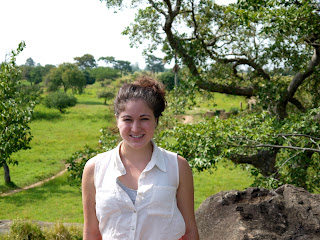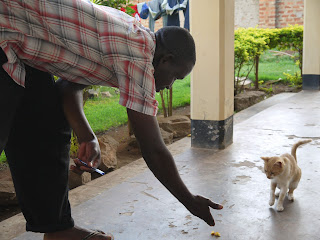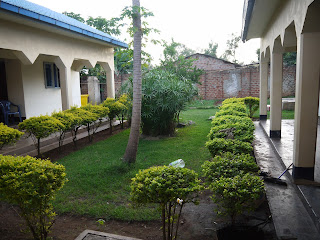 Among the many lessons, facts, and words I have learned in Uganda, arguably the most important is the meaning of Psalm 46. I have, by necessity, had to learn to be still. Anyone who knows me can attest that this task is quite difficult for me. I don't like to be still. To the contrary, I enjoy filling every minute of my life and calendar. Some may call it an addiction to busyness or masochism... I call it efficiency. I want to get the most out of every minute I have on this earth, and sometimes I misguidedly pursue that mission by trying to do everything. Unfortunately, God created us biologically, spiritually, and emotionally to need rest. When we neglect that need, bad things happen.
Among the many lessons, facts, and words I have learned in Uganda, arguably the most important is the meaning of Psalm 46. I have, by necessity, had to learn to be still. Anyone who knows me can attest that this task is quite difficult for me. I don't like to be still. To the contrary, I enjoy filling every minute of my life and calendar. Some may call it an addiction to busyness or masochism... I call it efficiency. I want to get the most out of every minute I have on this earth, and sometimes I misguidedly pursue that mission by trying to do everything. Unfortunately, God created us biologically, spiritually, and emotionally to need rest. When we neglect that need, bad things happen. As I have noted, work proceeds slowly. I have ample downtime in the afternoon and on weekends. Even during the day, I sometimes sit and read or catch up on email because I'm waiting on the girls or there is simply nothing I can do. At first, I felt anxious and guilty that I wasn't busy, making myself useful. While that feeling remains, I'm starting to ease into the notion that things happen on a different time-scale here... that it's okay to relax.
As I have noted, work proceeds slowly. I have ample downtime in the afternoon and on weekends. Even during the day, I sometimes sit and read or catch up on email because I'm waiting on the girls or there is simply nothing I can do. At first, I felt anxious and guilty that I wasn't busy, making myself useful. While that feeling remains, I'm starting to ease into the notion that things happen on a different time-scale here... that it's okay to relax.Even in conversations with people, we feel the need to fill our pauses with "um"s and "like"s, and every silence is an 'awkward silence.' Here, it's okay to just be. It is satisfying enough to just be in the presence of others, to walk along the dirt road or sit under the mango tree without filling the empty space with meaningless words.
 Amid the chaos of American life, God's whispers are drowned out by everything else screaming for my attention. Noise fills the space between me and my Creator. But when I can just sit and be still, God begins to speak. Well, I guess He's been speaking all along. I just couldn't hear Him. Here, I can know Him. I can look out at His creation, the beauty that all of our technology and artistry fails to grasp or recreate. The beauty that springs up from the ground and just happens. Not for any explicit reason. Not to add some color to an apartment complex or a border to the street. It's just there. Because God made it. Because He delights in beauty. Because He delights in His creation.
Amid the chaos of American life, God's whispers are drowned out by everything else screaming for my attention. Noise fills the space between me and my Creator. But when I can just sit and be still, God begins to speak. Well, I guess He's been speaking all along. I just couldn't hear Him. Here, I can know Him. I can look out at His creation, the beauty that all of our technology and artistry fails to grasp or recreate. The beauty that springs up from the ground and just happens. Not for any explicit reason. Not to add some color to an apartment complex or a border to the street. It's just there. Because God made it. Because He delights in beauty. Because He delights in His creation. I was especially convicted of this when visiting Baker's Fort with the InterVarsity team (a group visiting from America) last weekend. Just a 20 minute drive from the Centre lies a national historical site. The Arabs used this fort to hold, sort, and execute slaves until Samuel Baker, a European explorer looking for the source of the Nile, overcame the fort and freed the slaves who were imprisoned there. The stories and sights were heart-wrenching, imagining starving women being forced to live in a 2-foot tall cavity under a rock and seeing the ax marks in the stone from countless murders of those 'unfit' to be sold. Despite all of the horror that happened there, the site was paradoxically beautiful and peaceful. I sat on a rock with this as my view and just relaxed into the beauty and quiet of nature.
I was especially convicted of this when visiting Baker's Fort with the InterVarsity team (a group visiting from America) last weekend. Just a 20 minute drive from the Centre lies a national historical site. The Arabs used this fort to hold, sort, and execute slaves until Samuel Baker, a European explorer looking for the source of the Nile, overcame the fort and freed the slaves who were imprisoned there. The stories and sights were heart-wrenching, imagining starving women being forced to live in a 2-foot tall cavity under a rock and seeing the ax marks in the stone from countless murders of those 'unfit' to be sold. Despite all of the horror that happened there, the site was paradoxically beautiful and peaceful. I sat on a rock with this as my view and just relaxed into the beauty and quiet of nature.
God even left some of His own works of art at the fort. Among them, a rock in the shape of a shark and a stone slab in the shape of Africa. Two cracks run down the center and top of the African map suspiciously close to the Tropic of Cancer and Prime Meridian, and when it rains a puddle naturally forms at about the analogous location of Lake Victoria.
Another adorable work of nature, our new house guest is much more appreciated than the rooster. Michael is keeping his new puppy at the guest house until he takes her down to Kampala. She's so adorable. I gave her a bath on the first night, and she was not happy about it. But about 5 shampoos later, she was clean and happy.
As I briefly mentioned, there are visitors here from InterVarsity New England and Focus (the Uganda analog to InterVarsity). It's great to have some Americans to share with, and they have been so kind to me. I have enjoyed their sessions and company and will certainly miss them when they leave on Tuesday. An added surprise, Petek (the MIT InterVarsity staff) is on the trip! I have received many emails from her and heard her name on campus, but I just met her here in Uganda! It truly is a small world after all.
Among my other adventures this week, I learned to make samosas and mugati malim (sweet bread). I also ran my 2nd test with the girls-- a much simplified and adapted version of the Wisconsin Card Sort Test. It calls on many aspects of executive function, most prominently the function of task switching. In this exercise, the participant sorts a series of cards into 3 piles labeled with a red triangle, blue circle, or green square. The sorting cards are any permutation of these 3 shapes and colors. The participant sorts by color or shape, with the instructions switching every 12 cards. This task is actually much more difficult than it appears. When the instructions change, it is easy to continue sorting using the previous instructions (a mistake called a perseveration error). The frequency of these errors indicates the development of various executive function processes, including inhibition and attentional control.






































